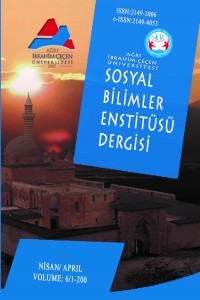MİSAFİR KONUŞMACI DESTEKLİ ÖĞRETİM TEKNİĞİ HAKKINDA ÖĞRETMEN ADAYLARININ GÖRÜŞLERİNİN DEĞERLENDİRİLMESİ
Misafir Konuşmacı, Akademik Başarı, Motivasyon, Öğretmen Adayları
___
- Ashley, V. B. (2010). Using Internet videoconferencing to connect fashion students with apparel industry professionals (Doctoral dissertation, University of San Diego).
- Belser, C. T., Prescod, D. J., Daire, A. P., Cushey, K. F., Karaki, R., Young, C. Y., & Dagley, M. A. (2018). The Role of Faculty Guest Speakers and Research Lab Visits in STEM Major Selection: A Qualitative Inquiry. Journal of Career and Technical Education, 33(1), 8-26.
- Bonwell, C. C., & Eison, J. A. (1991). Active Learning: Creating Excitement in the Classroom. 1991 ASHE-ERIC Higher Education Reports. ERIC Clearinghouse on Higher Education, The George Washington University, One Dupont Circle, Suite 630, Washington, DC 20036-1183
- Bridges, S. (1999) Oral case exams in marketing: Enhancing and evaluating communication and problem-solving skills. Marketing Education Review, 9, 25-31.
- Brown, R. C. (1954). Classroom Guest Speaker: Some Steps to Take. The Clearing House, 29(1), 7-7.
- Dalakas, V. (2016). Turning Guest Speakers' Visits into Active Learning Opportunities. Atlantic Marketing Journal ,93-99.
- Farruggio, P. (2009). Bilingual Education: Using a Virtual Guest Speaker and Online Discussion to Expand Latino Preservice Teachers' Consciousness. Multicultural Education, 17(1), 33-37.
- Fedoryshyn, M. W., & Tyson, T. N. (2003). The impact of practitioner presentations on student attitudes about accounting. Journal of Education for Business, 273 – 284.
- Gibson, D. E. (2004). Role models in career development: New directions for theory and research. Journal of Vocational Behavior, 65(1), 134–156.
- Hogan, C. (2009). Making the most of visiting speakers (for everyone involved). Training & Management Development Methods, 23(4), 371.
- Lang, J. M. 2008, April 7. “Guest Speakers.” The Chronicle of Higher Education.Retrieved from http://www.chronicle.com/article/Guest-Speakers/45746/
- Li, L., & Guo, R. (2015). A student-centered guest lecturing: A constructivism approach to promote student engagement. Journal of instructional pedagogies, 15.
- McCleary, K. W., & Weaver, P. A. (2009). The effective use of guest speakers in the hospitality and tourism curriculum. Journal of Teaching in Travel & Tourism, 8(4), 401-414.
- McKain, D. R. (2012). Making math real: Effective qualities of guest speaker presentations and the impact of speakers on student attitude and achievement in the algebra classroom. Robert Morris University.
- McRee, A. L.,Madsen, N., & Eisenberg, M. E. (2014). Guests peakers in school-based Sexuality education. American Journal of Sexuality Education, 9(2), 205-218.
- Merle, P. F., & Craig, C. (2017). Be My Guest: A Survey of Mass Communication Students' Perception of Guest Speakers. College Teaching, 65(2), 41-49.
- Metrejean, C., Pittman, J., & Zarzeski, M. T. (2002). Guest speakers: reflections on the role of accountants in the classroom. Accounting Education, 11(4), 347-364.
- Ormrod, N. G. (2004). The use of guest speakers, company visits and professional bodies' events in the curriculum. Retrieved from https://e-space.mmu.ac.uk/id/eprint/6264
- Özerbaş M.A (2003). Bilgisayar destekli bağlaşık öğretimin öğrenci başarısı, motivasyon ve transfer becerilerine etkisi (Doktora tezi) Yükseköğretim Kurulu Ulusal Tez merkezi’nden edinilmiştir. (Tez No: 127689)
- Pajares, F. (2004). Albert Bandura: Biographical sketch. Retrieved November 28, 2006, from http//des.emory.edu/mfp/bandurabio.html
- Parks, L. T. (2019). Upward Bound Graduates Transition From High School to College.Upward Bound Graduates Transition From High School to College (waldenu.edu)
- Paul, P., & Mukhopadhyay, K. (2005). Experiential learning in international business education. Journal of Teaching in International Business, 16(2), 7-25
- Riebe, L.,Sibson, R., Roepen, D., & Meakins, K. (2013). Impact of industry guest speakers on business students' perceptions of employ ability skills development. Industry and Higher Education, 27(1), 55-66.
- Sage, M. (2013). Distance guest speakers in online synchronous classrooms: Practical and legal considerations. Journal of Teaching in Social Work, 33(4-5), 385-392.
- Sebba, A. (2000), ‘The students hang on every word, they’re rapt’, The Times HigherEducation Supplement, http://www.timeshighereducation.co.uk/story.asp?storyCode= 152652§ioncode=26, last viewed 26 June 2011.
- Sniezek, T. (2005). Avoiding the pitfalls of the invited speaker. Exchanges:The Online Journal of Teaching and Learning in the CSU. Retrieved November 29, 2006, from http://www.exchangesjournal.org
- Soiferman, L. K. (2019). Writing Is Hard Work: The Importance of Story Sharing in a Writing Classroom Involving Collaborative Colleagues as Guest Speakers. Online Submission.
- Tsataros, D. (2016). Teaching Domestic Violence through Guest Speaker Panels. Journal of the Indiana Academy of the Social Sciences, 19(1), 14.
- Yıldırım, A., & Şimşek, H. (2016). Sosyal bilimlerde nitel araştırma yöntemleri (11. baskı). Ankara: Seçkin Yayıncılık
- ISSN: 2149-3006
- Yayın Aralığı: Yılda 2 Sayı
- Başlangıç: 2015
- Yayıncı: Ağrı İbrahim Çeçen Üniversitesi
COVID-19 Pandemi Sürecinde Bilişim Teknolojileri Bağımlılığı
DERÛNÎ-ZȂDE MUHAMMED HULÛSÎ’NİN DİVANÇESİ’NİN YENİ BİR NÜSHASI VE BU DİVANÇE’DEKİ TASAVVUFÎ UNSURLAR
HAMZA-NÂME ADLI ESERİN 72. CİLDİ’NDE TÜRK DİL TARİHÎNİN GELİŞİM SEYRÎ
MİTOLOJİK, KÜLTSEL VE İKONOGRAFİK AÇIDAN ANTİK ÇAĞ’DA KHARİTLER
Serdal GÜNDOĞDU, Nurettin KOÇHAN, Ahmet TERCANLIOĞLU
CİZRE İSMAİL EBUL-İZ EL-CEZERİ MÜZESİ’NDE BULUNAN BİR GRUP MADENİ İBRİK
ARAP ŞİİRİNDE TASVİR (Emeviler-Abbasiler)
BERAT ALANYALI’NIN BOZKIR GECESİNDE BİR TREN ADLI ESERİNE TEMATİK AÇIDAN GENEL BİR BAKIŞ
COĞRAFİ İŞARETLİ ÜRÜNLER VE GASTRONOMİK LEZZETLER: TOKAT ÖRNEĞİ
